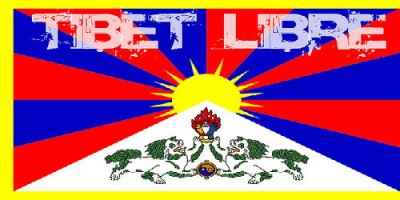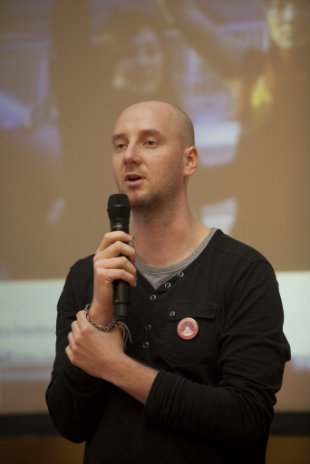WARSAW, POLAND. As part of the live coverage from this year’s World Summit of Nobel Peace Laureates, ROOSTERGNN is conducting a series of follow-up interviews with speakers and representatives of diverse organizations present at the event.
As a chapter of the International Students for a Free Tibet (SFT) movement, Students for a Free Tibet Poland works to help the Tibetan people regain their freedom. Aware of the importance of students and youth in social justice movements throughout history, the organization is committed to using this power to making similar changes in Tibet. In solidarity with the Tibetan people in their struggle for freedom and independence, Students for a Free Tibet seeks to through provoke such changes through education, grassroots organizing, and non-violent direct action.
ROOSTERGNN had the opportunity to speak with Piotr Cykowski, co-representative of Students for a Free Tibet Poland and coordinator of the Tibet Program in The Other Space Foundation. Moreover, as a human rights activist, Cykowski has worked with various NGOs in Poland on human rights and equality issues. Here, he discusses the situation in Tibet as well as his organization’s role in helping the Tibetan people.
SFT Poland is a member of SFT International and was founded in February 2013. Was there anything in particular that inspired you to set up a branch of this organization in Poland?
Piotr Cykowski: The idea of SFT as a youth-based, vibrant international movement was attractive to Polish activists for many years and we have worked together on various campaigns for more than 10 years. We’ve finally decided to officially create a Polish chapter, have members and be part of this global movement that believes in social change based on young people. I think it is strategic to use young people and students to move forward– they offer their time, energy and skills to Tibet, but working with the Tibet issue also offers them the opportunity for explore activism, work for a just, moral cause and do something big. Finally, there was good historical reason – 2013 was the 100th anniversary of the Tibet Independence Proclamation.
Do the two countries, Poland and Tibet, have any kind of common historical relationship?
We believe there is some common understanding of oppressed nations among Poles due to the Polish long history of occupation, destruction and foreign domination. This is what a generation of people are saying who experienced life under the undemocratic and oppressive system in Poland that only ended 25 years ago. Representatives of Tibet and the Dalai Lama have also said this when they visited Poland and the Baltic states.
I think, in political terms, relations were “established” with the first visit of the Dalai Lama XIV to Poland in 1993, organized by a circle of human rights activist, when he was also meeting with top politicians like President Lech Walesa. Since then, he is received in Poland as an important figure.
A less formal reason has to do with the little known story of Polish philosopher and spiritual practitioner, Mrs Wanda Dynowska (Uma Devi). She spent many years in India and was a very active supporter for Tibetan refugees who escaped after the anti-Chinese Tibetan uprising in 1959. The Dalai Lama has called her “Polish mother”, and it was she who, in late 60s, told Cardinal Wojtyla, later Pope John Paul II, about the tragedy of the Tibetans. The Polish Pope privately met with the Dalai Lama a few times.
Are Polish citizens aware of the situation in Tibet? If yes, do you think they are becoming more involved?
The turning point was the 2008 uprising in Tibet– waves of mostly peaceful Tibetan protests gained momentum on the eve of the Beijing Olympic Games. The unusual sympathy of the Polish media, some of which have anti-communist roots, created a strong general awareness and as a result, support was seen on the streets that year. Polls at that time showed that Poles are critical toward Chinese human rights records in Tibet. Moreover, people expect more concrete actions from politicians.
On the other hand, people in Poland are not good activists. In general, we feel we did our job, fighting communism with “Solidarnosc” and are very proud of that. Unfortunately, we are not so interested in foreign affairs. I think human rights organizations play an important role in creating this awareness as well as making people more conscious, more responsible, and in fact – less comfortable in their own lives. In our global times, this is the reality. Less and less, tragedies are simply some far away occurrence. They may touch us very easily. History teaches us that human rights, peace and stability are not given to anyone forever. It needs to be cultivated and protected. We do this in our own way by supporting the Tibetan peaceful fight for justice.
What types of programs have you organized to raise awareness in Poland of the situation in a far away country like Tibet? What types of platforms do you use to reach a larger number of people?
We are taking part in global campaigns that are coordinated by Students for a Free Tibet on an international level from New York to New Delhi to Taipei. We are working closely with the International Tibet Network – a global coalition of Tibet related organizations (see related ROOSTERGNN interview with the International Tibet Network here). We try to ensure that Poland is a visible, active part of these campaigns. Mostly, we promote them via the Internet, our website and social media, but we also try to reach and talk to people directly at meetings organized in other cities. For us, people are very important. We need to remember that Tibetan population is small. These 6 million Tibetans are carrying thousands years of history, unique culture, religion, and language, all of which may be easily smashed by the 1,3 billion who make up the Chinese population. Therefore, each voice of support from the free world matters so much. We also try to work with bigger organizations and take part in important events like, recently, the Summit of Peace Nobel Award Laureates in Warsaw or possibly in future, some festivals.
What has been the response of the Polish government to SFT Poland? Do you receive any support, financial or otherwise, from government organizations or private companies?
An important part of our work is lobbying. We sometimes meet with Polish officials and send them letters on behalf of our members as well as the whole Tibet movement. However, being independent is one of our strongest principles. We decided to fund our work only from membership fees. At SFT Poland, we don’t accept any other donations. In the long run, I think this will make us reliable and demonstrate our mission to be the voice of the people who are aware of Tibet rather than the voice of an interest group. Of course, we have our own vision of Tibet as an independent country. Although the One China policy is used primarily in discussion of Taiwan, it is also used while speaking about Tibet. Among the conditions the Dalai Lama must accept is “Tibet was always part of China and Taiwan is part of China.” Therefore the issues are connected. To be clear – we understand this may be the policy of ‘One PRC’; however, it is not a fact because, in reality, Taiwan is independent country. While we respect China’s position, we also believe that social movements have the power to change this vision.
After 50 years of repression in Tibet, what has been accomplished on an international level to improve the situation?
It is difficult question. In term of government support, we have seen deterioration in support for human rights policies. Since China has become a superpower, the world has become dependent on China. There was a time, using the momentum in 1989 that democracies could have been able to bring more concrete results when dealing with PRC, but unfortunately, they were busy doing business. The Clinton administration separated trade and human rights in the early 90s. So, the current situation in Tibet is the result of nearsightedness of the world leaders twenty, thirty years ago.
On the other hand, Tibetans have gained strong international support, sometimes incomparable to other, bigger and similarly oppressed nations. This is mostly thanks to The Dalai Lama’s tireless efforts, non-violence political approach, spiritual power as well as Tibetans’ general devotion to him and his vision. However, it is also thanks to the many people who created venues for him, from the Indian government granting asylum and refuge for many Tibetans to the Nobel Committee and other individuals and organizations that have opened doors for him to world audiences.
On October 22, several Tibet activists protested in front of the United Nations Human Rights Council (UNHRC) order to pressure the UN to support a free Tibet. What is the current attitude of the UN towards a free Tibet? Has anything changed in the last few years?
We need to remember that China is stronger, not only in economic terms but also in political power, which it uses ruthlessly to secure its impunity wherever possible, whether through political or economical corruption, bullying or buying other governments. However, we see that while repressions in Tibet are currently the strongest since the ‘cultural revolution’, the world is losing patience. Nowadays, victory is when the word Tibet is mentioned in official UN communications, something Chinese diplomats don’t like very much. Last year, high UN officials, like the High Commissioner for Human Rights, and other experts expressed their concerns about China’s Tibet policies. It is crucial that events that occur in Tibet are named and shamed, because it officially creates a base for further diplomatic activities. Of course, we expect much more. Countries that raised their concerns about Tibet are an elite club of just a few democracies. We need them to work together to strengthen this voice as well as resist strong Chinese pressure.
How can those interested in improving the situation in Tibet become involved, either via your organization or via another one?
For those in Poland, please visit our website: www.sftpoland.org and for people from other countries, please visit our international web page: www.studentsforafreetibet.org. You may also find your nearest Tibet organization from the International Tibet Network website: www.tibetnetwork.org. Last but not least, you can contact me at kontakt@sftpoland.org.
Correction: November 22, 2013. In an earlier version of this interview, Mr. Cykowski erroneously stated that the 2012 was the 100th anniversary of the Tibet Independence Proclamation. The correct anniversary date is 2013.


